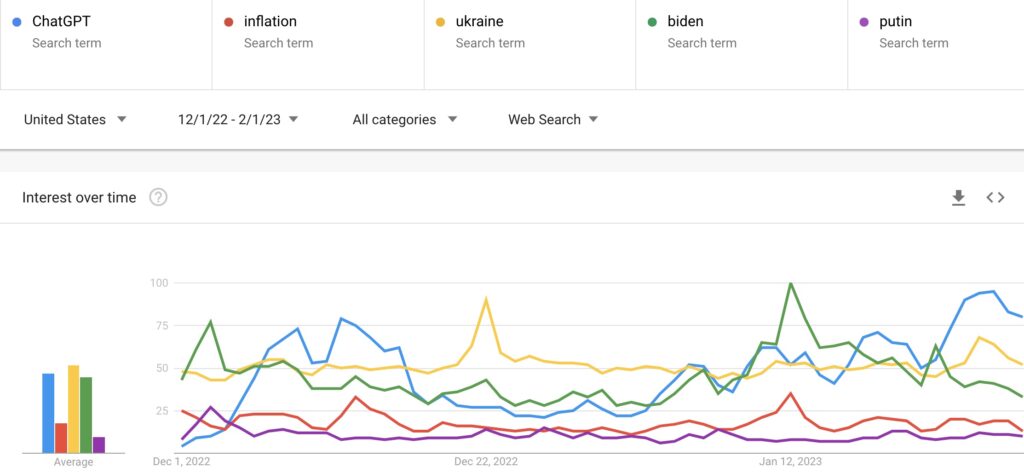
ChatGPT has become the infatuation of the media and web searches these last two months. When you Google “ChatGPT” right now, you get “About 568,000,000 results (0.61 seconds).” From what I’ve read, many of the articles on this subject are about its weaknesses, so I am writing about its practical potential in business applications.
When I asked about business applications in my first “interview” with ChatGPT, it suggested these five use cases: Customer Service, Content Creation, Lead Generation, Business Intelligence and Language Translation. Three of those functions are represented in its name. Content Creation is what a “Generative” language model does. Business Intelligence is exhibited by the “Pre-trained” functionality how it responds when you type in a question. Language Translation a natural for a “Transformer” and translation service is already proven to be somewhat functional via competing web services.
As a veteran of ScanSoft which acquired and became Nuance, I watched the development of Dragon NaturallySpeaking and then the original support for Apple’s Siri which combines both voice recognition and text-to-speech, I saw a constant evolution of applied language-based technology. In its announcement (March 4, 2022) of the $19.7B acquisition of Nuance, Microsoft touted “conversational AI and ambient intelligence.” With CNBC reporting that MSFT will invest $10B in OpenAI, creator of ChatGPT, it makes sense that initial business apps for ChatGPT will include Customer Service, and its related field, Lead Generation.
Assuming speech front- and back-ends so that customers can converse naturally with ChatGPT, how do its capabilities stack up to the requirements of these apps? Anyone who spends a few minutes asking questions at chat.openai.com/chat knows the responses are impressive and well-composed. Whether or not they are correct, that’s a separate question, we’ll come to that. We know that ChatGPT is currently pre-trained on “tens to hundreds of billions of words.” Facilities are available for training on specific collections of products and services, we could even use the same materials we use to train the human Customer Service staff. So, subject matter should be no problem.
What about ChatGPT’s language itself? In my informal survey of several dozen responses, I note that language generated falls at higher levels of the common measures found in MS Word document stats, falling between 35-53 for Flesch Reading Ease (scale of 0-100 where 90-100 = 5th grade) and 9th to 15th for Flesch-Kincaid Grade Level. For perspective, this article comes in at 47.3 and 11.0 respectively, so not too hard to read, right? But it is common in advertising for the text to be written at 5th to 7th grade level.
I asked ChatGPT why we need humans in customer service, and always diplomatic, the reply was: “Human customer service agents can step in to provide a personalized and empathetic response.” Right now, ChatGPT doesn’t know who it’s talking to, unlike a human, it doesn’t ask your name. So, easy to fix the “personalized” part. In my experience, it’s already pretty decent at the “empathetic” part, or at least it is obsequious.
For example, when I ask questions that I know the answer to, and ChatGPT gets the answer wrong, I correct it and it responds politely. In talking about Aeneas, it told me he ended up in Athens. I corrected that, and I received this gracious reply: “I apologize for the mistake in my previous response. You are correct. Aeneas did not end up in Athens, but in Rome.” This is the common pattern when you state that the answer is wrong. Other times, you can get “I apologize for any confusion in my previous responses.” So far, so good on the empathy measure.
Another thing that humans are good at is fuzzy understanding, I asked ChatGPT about this. The unsurprising response: “Yes, I am designed to handle various types of queries including those that are phrased imprecisely or ambiguously.”
A couple of other shortcomings, if only on the demo site, that will have to be fixed for ChatGPT to work in Customer Support. Here’s something that most computer programs and humans do: “I do not have the ability to retain previous conversations or knowledge of previous interactions.” I asked, “Do you learn when users correct you?” ChatGPT responded: “No, I am not capable of learning from individual interactions.”
Easy prediction: ChatGPT will be very good at Customer Support. And once it learns how to remember what people say, it will be great at Lead Generation, too.
#AI #Microsoft #Nuance #CustomerSupport #LeadGeneration #ChatGPT
PDF Expert – Master PDF and OCR
Copyright © 2023 Tony McKinley. All rights reserved.
Email: amckinley1@verizon.net